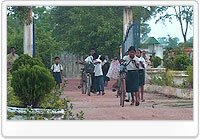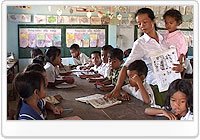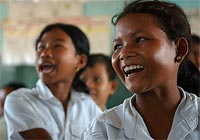 By 6 a.m., students are already streaming through the front gate of the Trapaing Chhouk school, some on foot, others on bicycles. (Photo UNICEF)
By 6 a.m., students are already streaming through the front gate of the Trapaing Chhouk school, some on foot, others on bicycles. (Photo UNICEF) Beyond simply increasing enrolment numbers, UNICEF hopes improved schools will provide new opportunities for Cambodia’s next generation (Photo UNICEF)
Beyond simply increasing enrolment numbers, UNICEF hopes improved schools will provide new opportunities for Cambodia’s next generation (Photo UNICEF) UNICEF Cambodia’s Child Friendly School initiative aims to get all children into class by the age of six and improve the quality of education nationwide. (Photo UNICEF)
UNICEF Cambodia’s Child Friendly School initiative aims to get all children into class by the age of six and improve the quality of education nationwide. (Photo UNICEF)Child-friendly schools give Cambodian children a boost
By Steve Nettleton
UNICEF
KAMPONG SPEU, Cambodia, 12 July 2006 – At the crack of dawn, the school day swings into motion in Trapaing Chhouk school, several kilometres down a dirt track from the nearest town.
By 6 a.m., students are already streaming in the front gate. Some come on foot, others on bicycles. Many are carrying branches or large chunks of bark to be used as firewood.
They have come early for breakfast. Student volunteers scoop heaps of rice, lentils and green vegetables into bowls, which the children then take outside or to their classrooms. It’s simple fare that goes a long way in this rural region, where many families still struggle to feed themselves.
Beyond simply increasing enrolment numbers, UNICEF hopes improved schools will provide new opportunities for Cambodia’s next generation
New opportunities for children
The morning meal at Trapaing Chhouk is the result of a partnership between UNICEF and the World Food Programme. It’s also a key component of the Child Friendly School initiative, which aims to get all children into class by the age of six and improve the quality of education nationwide.
A child-friendly school actively identifies excluded children, gets them enrolled in school and acts in the interests of the 'whole' child – including his or her health, nutrition and overall well-being.
Beyond simply increasing enrolment numbers, UNICEF hopes improved schools will provide new opportunities for Cambodia’s next generation. In a country where fewer than 20 per cent of girls are enrolled in secondary school, achieving these goals is a daunting task that requires cooperation from many organizations.
“The fact that we have support not just from the World Food Programme and UNICEF but from the whole UN country team to increase children’s participation in education is very important,” said UNICEF’s Representative in Cambodia, Rodney Hatfield. “In my opinion, that’s the UN at work.”
‘Now I have energy’
Pech Phary, 12, expects to be one of those who make it through her schooling. She is in fifth grade, one year away from moving on to secondary school.
Phary says it’s not easy to stay in class. She lives in a nearby village, where she must balance her studies with caring for her family’s farm and livestock. Before her school started serving breakfast, it took more effort and incentive to get to school.
“Before, I was always tired,” she said. “But now I have energy and am happy at class.”
And breakfast is just the beginning. The Child Friendly School initiative also promotes clean and healthy classroom environments and better training of teachers. It works to involve the local community in school planning and development, as well.
With support from UNICEF, the programme has been implemented in more than 500 schools across six Cambodian provinces. By 2010, UNICEF and its partners say they would like to more than double that figure.
By 6 a.m., students are already streaming in the front gate. Some come on foot, others on bicycles. Many are carrying branches or large chunks of bark to be used as firewood.
They have come early for breakfast. Student volunteers scoop heaps of rice, lentils and green vegetables into bowls, which the children then take outside or to their classrooms. It’s simple fare that goes a long way in this rural region, where many families still struggle to feed themselves.
Beyond simply increasing enrolment numbers, UNICEF hopes improved schools will provide new opportunities for Cambodia’s next generation
New opportunities for children
The morning meal at Trapaing Chhouk is the result of a partnership between UNICEF and the World Food Programme. It’s also a key component of the Child Friendly School initiative, which aims to get all children into class by the age of six and improve the quality of education nationwide.
A child-friendly school actively identifies excluded children, gets them enrolled in school and acts in the interests of the 'whole' child – including his or her health, nutrition and overall well-being.
Beyond simply increasing enrolment numbers, UNICEF hopes improved schools will provide new opportunities for Cambodia’s next generation. In a country where fewer than 20 per cent of girls are enrolled in secondary school, achieving these goals is a daunting task that requires cooperation from many organizations.
“The fact that we have support not just from the World Food Programme and UNICEF but from the whole UN country team to increase children’s participation in education is very important,” said UNICEF’s Representative in Cambodia, Rodney Hatfield. “In my opinion, that’s the UN at work.”
‘Now I have energy’
Pech Phary, 12, expects to be one of those who make it through her schooling. She is in fifth grade, one year away from moving on to secondary school.
Phary says it’s not easy to stay in class. She lives in a nearby village, where she must balance her studies with caring for her family’s farm and livestock. Before her school started serving breakfast, it took more effort and incentive to get to school.
“Before, I was always tired,” she said. “But now I have energy and am happy at class.”
And breakfast is just the beginning. The Child Friendly School initiative also promotes clean and healthy classroom environments and better training of teachers. It works to involve the local community in school planning and development, as well.
With support from UNICEF, the programme has been implemented in more than 500 schools across six Cambodian provinces. By 2010, UNICEF and its partners say they would like to more than double that figure.

























2 comments:
they talk all about partnership between different international organizations. What about partnership with Cambodian institutions? what is the point of outsiders providing education in Cambodia, if not in the long run Cambodians are in charge of their own affairs?
I do agree with the first commentator that the organisations work only with their UN family organisations, and most of the budget for any programme is mostly spent on the running of the programme, staff's fancy salary, especially that of foregin staff and consultants which is equal to hundred times of the local workers. Very great majority of their focus is on service delivery such as food delivery as done by World Food Programme (WFP). Others include projects carried out by themselves, their foreign staff on governance and policy issues. This working approach is not good at all for long-term development and their so-called poverty alleviation. Rather, it just makes the poor poorer.
Those UN families would have helped Cambodians and the most poor and marginalised people in particular if they had decentralised the power to the community organisaitons and people, built their capacity and organisation. They should have stood behind, mobilised and supported them to work on their own, at their own pace, initiatives, strategies. If the policy and decision are made by the elite, they will give benefits only to those elite people, but not the poor.
It is the people themselves who understand and can work best to feed their strategy and plan into their factual situation. By so doing, the people can, of course, ensure their sustained development and better livelihood.
Post a Comment